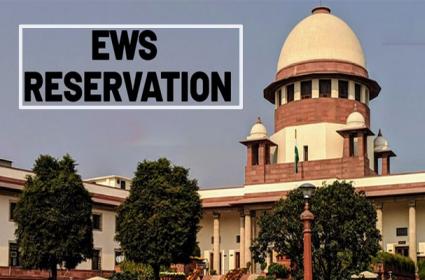Explainer: SC Upholds EWS Quota, Takeaways From The Case

The Supreme Court on November 7 upheld the 10% reservation in education and employment for Economically Weaker Sections (EWS) from the general category. The judgment was pronounced by a five-judge bench headed by Chief Justice UU Lalit and comprising Justices Dinesh Maheshwari, S Ravindra Bhat, Bela M Trivedi and JB Pardiwala, out of which 3 judges held in favour of the reservation and two judges struck it down.
Constitution Amended To Provide 10% EWS
On January 12, 2019, the Government of India amended the Constitution to provide a 10 percent reservation to the candidates from the general category that belongs to the "Economically Weaker Section (EWS)" of the society. To qualify for the reservation, the household income of the candidate must be less than Rs 8 lakh per annum.
People belonging to OBC, SC or ST categories are not eligible for reservations under this amendment.
The 103rd Constitutional Amendment Act of 2019, introduced this by adding sub-section (6) in Articles 15 and 16. The sub-section allows the state to make provisions for EWS in educational institutions and places of employment over and above the existing reservation, as long as it was limited to 10%. Existing Articles 15(4), 15(5), and 16(4) of the Constitution provide for reservation for SEBCs/OBCs/SCs/STs.
A section of the society stated that the amendment violated the basic structure of the Constitution as under the Indra Sawhney & Others vs Union of India case of 1992. The Supreme Court stated that no amendment that violates the Constitution's basic structure would be valid. It further stated that the total number of reserved seats and positions could not exceed 50 percent of the total reservation. Also, economic backwardness cannot be the sole reason for reservation.
The challenge to the validity of the constitutional amendment was based on three grounds.
-Reservation based on economic criteria violates the basic structure of the Constitution.
-The exclusion of Scheduled Castes, Scheduled Tribes, and the non-creamy layer of Other Backward Classes (that is, the members of the OBCs who are economically disadvantaged) from the EWS quota is discriminatory.
- An additional 10% reservation for EWS violates the 50% reservation limit set by previous judgments of the Supreme Court.
In the present case, the challenge to the 103rd Constitutional Amendment was based on the argument that one feature of the “basic structure” is the protection guaranteed to socially backward classes. By providing economic criteria for reservation, the Amendment Act violates these constitutionally guaranteed protections.
Supreme Court Findings
The majority decision of the Supreme Court upheld the amendment and observed, that the 103rd Constitutional Amendment does not violate the basic structure of the Constitution.
The argument that the constitutional scheme provides for reservation only for SEBCs/OBCs/SCs/STs given the existing text of Articles 15(4), 15(5) and 16(4) of the Constitution is incorrect.
The amendment benefits those economically weaker sections who have till now not gotten the benefit of affirmative action (particularly of reservation), which was granted to the other class/classes of citizens namely, the SEBCs/OBCs/SCs/STs.
Justice Dinesh Maheshwari in the judgment said the EWS quota law did not violate the basic structure or equality code for taking into account the economic criterion. He said the EWS reservation does not cause damage to any essential feature of the Constitution by exceeding the 50 percent ceiling for quota since the ceiling is itself flexible.
Justice Bela M Trivedi said the 103rd constitutional amendment cannot be struck down on grounds of being discriminatory.
Justice JB Pardiwala concurred with their views and upheld the validity of the amendment.
However, Chief Justice UU Lalit and Justice Bhat dissented with the other three judges on the bench. CJI UU Lalit and Justice Bhat said the law was discriminatory and violative of the basic structure of the Construction. ( With inputs from Agencies and Hindusthan Times)
Congress leader Jaya Thakur moved the Supreme Court seeking a review of the judgment passed by three of the five-judge bench of the apex court who upheld the constitutional validity of the 103rd amendment of the Constitution providing 10% reservation for the economically weaker sections (EWS) on Wednesday. The review petition said the 3:2 judgment on the 10% quota for EWS violates the basic structure of the Constitution. It was also mentioned that the backward class cannot be determined only and exclusively with reference to economic criteria.
Also Read: Supreme Court Upholds 10% Reservations For Economically Weaker Sections
























